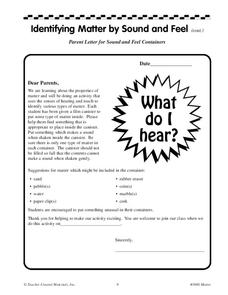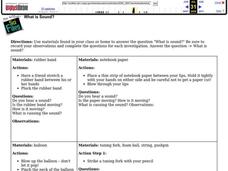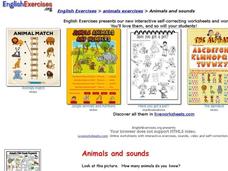Rochester Institute of Technology
Artificial Hearing
Your sense of hearing depends upon tiny hairs deep inside your ear and if you lose these hairs, you lose your hearing. Here, groups explore hearing through the decibel measurement of common sounds. As a class, participants discuss...
Curated OER
Can You Hear a Tree Fall in Space?
How does sound travel in space? Fifth graders investigate this question with a science activity, in which they research the properties of sound. Schedule a lab visit for individual Internet research, or include the activity after you...
Curated OER
Identifying Matter by Sound and Feel
In this identifying matter by sound and feel worksheet, learners participate in an experiment to identify a wide variety of different types of matter in film containers supplied by each student.
Curated OER
Sound
In this physics worksheet, students use the clues given on the bottom of the sheet to complete the crossword puzzle on sound. There are 18 clues to solve in the puzzle.
Curated OER
The Science of Sound
In this explanation of sound worksheet, students discover what sound is, how different sounds are made, frequency, how sound travels, how we hear, and a summarization. In this physical science worksheet, students answer ten comprehension...
Curated OER
Sound
In this sound worksheet, students read about sound waves, how they are graphed, what frequency is and how it's related to pitch and the speed of sound. Students solve 8 sections of problems including matching terms related to sound to...
Curated OER
HW Unit 10:5-Sound
In this sound worksheet, students answer 17 questions about sound, the wavelength of sounds, the frequency of sounds, the speed of sound, the types of sound waves and the effects of the medium sound travels through on its speed.
Curated OER
What is Sound?
In this sound worksheet, students complete 4 investigations to explore sound. These include the use of a rubber band, a blown up balloon, a piece of notebook paper and a tuning fork with a foam ball, string and pushpin. Students answer...
Curated OER
Good Vibrations
Third and fourth graders should enjoy this easy-to-implement activity involving a straw, and bottles filled with water. Learners manipulate the end of a straw in a way that results in a sound being made when it's blown. There is also an...
Curated OER
Sound and Hearing
In this sounds worksheet, students will review how sound is created by vibrations. Students will understand what creates vibrations and how the ear receives those sound waves. This worksheet has 10 fill in the blank, 9 multiple choice, 1...
Curated OER
Sound and Hearing
For this sound sources worksheet, students color in the pictures of the sound sources. Students then select words from the list to describe the sound each object makes.
Curated OER
Loud or soft?
Send this cute activity home with kids, to increase family involvement. They'll consider what would happen if rice was bounced in a tambourine, and then they'll complete a sound activity by makings an instrument out of wax paper and a...
Curated OER
Sound
In this sound activity, students understand how sound is created and how the human ear "hears." Students compare the frequency, amplitude, and speed of sound. Then students complete 10 matching, 7 fill in the blank, and 11 short answer...
Curated OER
How the Ear Receives Sound
For this biology worksheet, students identify how the ear receives sound by using the information given to cut and paste each section to complete a flow chart that illustrates this. They lightly color each section of the flow chart to...
Curated OER
Noise and Your Ears: Worth Hearing About
In this science activity, students complete various puzzles demonstrating knowledge of the ear and how it processes sound. An illustration of the ear with descriptions of each part is provided.
Curated OER
Scientific Methods in Biology
In this scientific methods instructional activity, learners will study a graph comparing the hearing range of humans to the range of sounds elephants make. Based on this graph, students will complete 3 short answer questions.
Curated OER
A Whale of a Story
Does sound travel faster in water or in the air? Put the question to the test with a science experiment. After reviewing a table of data, third and fourth graders decide which statements are true and which ones are false. The bottom of...
Curated OER
It's too loud!
Investigate soft, loud, and dangerous sounds. Little ones put a check next to the sounds that are loud, an X next to ones that are soft, and circle the ones that would require protective ear wear. Tip: Get out a tape player or computer...
It's About Time
Speedy Light
We know the speed of light, but can we measure the speed of dark? During the lesson, scholars perform gedanken, or thought experiments related to the speed of sound and the speed of light.
Child Care Lounge
Learning Foundations Curriculum
Here is a collection of activities that complements each of the five senses. Youngsters explore textures, sounds in song, food tastes and aromas, colors and patterns, and a variety of experiences that boost individuals' knowledge about...
It's About Time
Sounds from Vibrating Air
Take note, or notes, as the case may be. A scientific music lesson is the third in a set of eight covering waves and instruments. Scholars use straws, test tubes, and water to create various wind instruments. Then, they read and answer...
K12 Reader
Waves & Currents
Challenge your young readers with a passage about physical science. After reading about sound waves and electric currents, kids answer five reading comprehension questions about what they have read.
Curated OER
Animals and Sounds
In this animals worksheet, students watch a video, name animals, and answer multiple choice questions about what they saw and heard in the video. Students complete 3 activities.
Hachette Children’s Group
Our Five Senses
Show your class how to experience their world with the five sense. With worksheets on each sense, learners investigate their surroundings and categorize them into sight, smell, touch, hearing, and taste.

























